The death of the late Iranian President Ebrahim Raisi and several high-ranking officials in a helicopter crash has left the Islamic Republic facing an uncertain future. The government has arranged multiple days of mourning, starting with funeral prayers and a procession in the city of Tabriz. The bodies will then be transferred to Qom and Tehran for larger ceremonies. The investigation into the cause of the crash is ongoing, with speculation about the role of foggy weather and potential sabotage.
Following the crash, condolences and praise for Raisi have been pouring in from Iran’s allies, including Russia, China, and North Korea. Leaders such as Vladimir Putin, Xi Jinping, and Kim Jong Un have described Raisi as an outstanding statesman and a close friend. Raisi’s death has triggered reactions both domestically and internationally, with many mourning the loss of a key figure in Iranian politics. The comments from world leaders underscore the interconnected relationships between Iran and its allies.
The crash has raised questions about the future of the Iranian government, particularly as tensions with Israel remain high. Raisi, a conservative hardliner and protege of Ayatollah Khamenei, leaves behind a complicated legacy. While he was seen as an important figure in the hardline establishment, he also faced criticism for his role in suppressing dissent and uprisings. The loss of Raisi is expected to further destabilize a country already grappling with economic and political challenges.
The investigation into the crash is ongoing, with a commission appointed by Iran’s military chief to look into the cause. Initial indications point to foggy weather as a potential factor, but further analysis is needed. The crash has highlighted the risks associated with air travel, particularly in challenging weather conditions. The presence of senior government officials on board raises questions about safety protocols and the use of outdated aircraft.
The outpouring of condolences and praise for Raisi from world leaders reflects the interconnected nature of global politics. Iran’s relationships with Russia, China, and North Korea are an important part of its foreign policy strategy. The comments from international leaders underscore the significance of Raisi’s legacy and the impact of his death on Iranian politics. The investigation into the crash will provide further insight into the circumstances surrounding the tragic event.
In Iran, where dissent and unrest have been growing in recent years, Raisi’s death has sparked a mix of reactions. While many mourn the loss of a key political figure, others see an opportunity for change in the country’s leadership. Raisi’s polarizing legacy reflects the complex dynamics of Iranian society, with both supporters and critics voicing their opinions. The funeral ceremonies for Raisi and the other victims of the crash will be a time of mourning and reflection for the nation as it grapples with the loss of key figures in its government.











